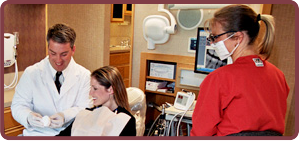
You’ve recently found out that your tooth has been decayed so severely that a simple filling will not do the trick, and you need a dental crown. This tooth-shaped cap is designed to fit snugly over the tooth to hold it together and protect it from further damage. Sounds great, right? Unfortunately, you experience some discomfort when you first get the crown placed. Why? What can you do about it? Let’s take a closer look at how to manage pain caused by dental crowns.
What Causes Crown Pain in the First Place?
You would think that since the tooth is no longer exposed to everyday wear and tear, that it would be immune to pain as well. Sadly, that isn’t always the case. Sometimes it can take a while before pain caused by decay fades. Other causes of crown pain include:
- Irritation and inflammation immediately following the procedure
- The root of the tooth becoming irritated or decayed because no root canal was done
- The crown not fitting correctly, causing chewing to press down further on the tooth than it used to
What Can You Do About the Pain?
Due to the cement used to place a crown, some sensitivity and discomfort for the first few days is completely normal and can often be remedied with an over-the-counter pain reliever such as ibuprofen or acetaminophen. This may manifest as sensitivity to hot and cold temperatures. In that case, it’s best to avoid hot and cold foods and beverages for a few days, and try using a toothpaste made for sensitive teeth. If pain persists, call your dentist right away. In the meantime, there are a few home remedies you can use.
If you don’t want to take a painkiller, you could try a more natural alternative. One popular method is to let a tablespoon of salt dissolve in a glass of water. Then, rinse and spit with this mixture until it’s all gone. Other common rinses include peppermint tea, alcohol, and a 3 percent hydrogen peroxide solution. They all kill bacteria, and the alcohol can even provide a numbing effect to the area surrounding the crown.
You could also apply tea tree oil or apple cider vinegar to the crown site with a soaked cotton swab. This should help make the area nice and numb. There are even some foods, such as cucumber, which possess anti-inflammatory properties that may help when you chew them and apply them to the crown site.
Experiencing some discomfort when getting dental crowns is fairly common, but any persistent pain needs to be dealt with immediately. Contact your dentist right away if your pain gets severe or lasts longer than a couple of days.
About the Author
At Hill Avenue Dental in Superior, WI, Dr. Doug Clark, Jr. enjoys treating patients of all ages. He has received extensive training from the Las Vegas Institute for Advanced Dental Studies and has been a dentist for more than three decades now. His practice offers CEREC same-day crowns, eliminating the need for often uncomfortable temporary crowns by placing your permanent one in just one appointment. If your crown is bothering you, don’t hesitate to contact Dr. Clark by clicking here or calling (715) 392-5161.









